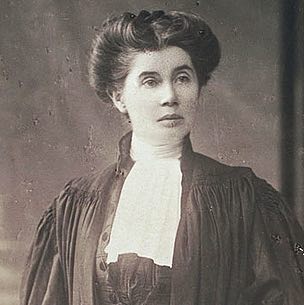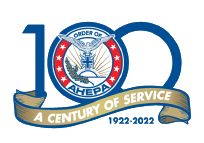Dr. Maria Kalopothakis

Dr. Maria Kalopothakis
Dr. Maria Kalopothakis (1859-1941) was born in Athens. The daughter of Rev. Dr. Michael and Martha Kalopothakis, she was the first women physician in Greece. She became a prominent doctor and pioneer in defending equal rights for women. Dr. Maria Kalopothakis was a humanitarian physician and believed that medicine was above all a selfless profession. She also stood out for her character, her education as well as for her writings in the fields of hygiene, religious poetry and translation. In recognition for her contributions, Dr. Maria Kalopothakis received medals and honors for both her scientific work and social engagement. Her contributions as a military surgeon was legendary, demonstrating unparalleled dedication, unwavering courage and heroism.
As a child, Maria loved studying medicine and frequently accompanied her father who was a medical doctor in Athens. She also wrote in the "Ephemeris ton Paidon" (Children's Paper) and the "Astir tis Anatolis" (The Star of the East), magazines that her father edited. When her father passed away in 1871, Maria Kalopothakis went to the United States for a few years. She returned to Athens where she graduated from high school.
After high school graduation, she returned again to the United States and enrolled at Radcliffe College (then known as the Harvard Annex). During her days at Radcliffe she attended rounds with the nurses at Massachusetts General Hospital in Boston. She returned to Athens after graduation. However, the Greeks were still very conservative towards women's education. As such, Maria Kalopothakis was unable to attend medical school at the University of Athens and attended the Medical School of Paris starting in October 1886. She returned to Athens in 1894. After passing the oral and written exams for her medical license in Greece, she practiced the medical specialties of Pediatrics and Gynecology. She continued her studies in general medicine at the Medical School at the University of Athens.
At the outbreak of the Greco-Turkish War of 1897, Queen Olga of Greece announced that volunteer nurses were needed for the care of wounded soldiers. Dr. Maria Kalopothakis trained these volunteer nurses, with the help of four medical students. Dr. Maria Kalopothakis also worked as a surgeon and served as the director of the Hospital of the Red Cross in Volos during the Greco-Turkish War of 1897. She received a silver medal from Queen Olga in the summer of 1899 in recognition of her hard and selfless work. Dr. Maria Kalopothakis along with other Greek women was also recognized by the world renowned English nurse Florence Nightingale.
Subsequently, Dr. Maria Kalopothakis opened a clinic for women and children which also trained nurses; she also focused on the problems of public health and the care and prevention of tuberculosis while maintaining her practice as a pediatrician. She worked with Dr. George Koromilas who conceived a method for treating tuberculosis by inhalation of carbon sulphide and offered her clinic to Dr. Koromilas for the conducting of clinical trials over the course of two years. The results of the first two stages for treating tuberculosis were encouraging. In 1902, Dr. Maria Kalopothakis was appointed professor of hygiene in the Arsakeion high school, a school established for the education of Greek girls. There she completed her work concerning hygiene in schools
In 1906, the International Council of Women established an office in Greece. Dr. Kalopothakis was appointed secretary for the first three years. In 1909, Dr. Maria Kalopothakis published a report on public health in Greece outlining rates of infant mortality, hygiene and tuberculosis in the book "The Health of the Nations." In 1912, she published "Elements of Hygiene for Schools" and a handbook entitled "Information for Health Teaching in Schools." She also founded the monthly "Hygeia" ("Health"") magazine.
During the Balkan Wars (1912-1913), Dr. Kalopothakis stood out for the medical care she provided to war victims in Epirus in mountain hospitals. Maria Kalopothakis also helped several hundred thousand Greek refugees that came to Greece after the Catastrophe of Smyrna in 1922. She also established a small hospital in Piraeus as a first aid station for the refugees coming from Smyrna.
Dr. Maria Kalopothakis passed away on January 1941 in Kifisia. At the time of her death, Dr. Maria Kalopothakis was financially broke since she provided her medical services on a pro bono basis since most of the patients she treated were poor. She is buried in the First Cemetery of Athens as are here parents and her brother Dimitrios Kalopathakis.
Dr. Maria Kalopothakis' memory, philanthropy, and contributions to medicine live on with The Hellenic Medical Society of New York which annually honors distinguished female physicians with the "The Maria Kalopothakis, M.D. - Distinguished Female Physician of the Year Award."
Also known as Dr. Maria Hooper Blackler "Mary" Kalopothakes, Minnie Kalopothakis
[ Read more about Michael Kalopathakis ]
[ Read more about Dimitrios Kalopathakis ]
First Greek-American Female Physician Philanthropic Patriotic Pioneer
Mary Kalopothakes was born in Athens in 1859, the daughter of Michael D. Kalopothakes a medical doctor from Athens, Greece, and of Martha Hooper Blackler from Marblehead, Massachussetts, USA. She studied at Greek and American schools and graduated from the Harvard Annex (now Radcliffe College). Mary wanted to study medicine, however, because of the difficulties posed due to the fact that she was a woman in the Greek University, she commenced her studies in Paris, France on October 1886. She completed a thesis titled the "Troubles et lesions gastriques dans la dyspepsie gastrointestinale chronique des nourissons." She returned to Athens in 1894 and passed the oral and written exams and began practicing the specialties of Pediatrics and Gynecology. The pioneering female physician was an active member of the Union of Greek Women which was mobilized at the onset of the Greco-Turkish War of 1897. She worked as a Director and a surgeon of the Hospital of the Red Cross in Volos. She was recognized by Her Majesty Queen Olga for her daily training and seminars to prepare nurses to serve on the front. At the end of the war of 1897 the Greek women were also recognized by Florence Nightingale, the English nurse who made outstanding contributions to the knowledge and improvement of public health. Mary Kalopothakes opened a clinic for women and children and trained nurses focusing on public health and the prevention of tuberculosis while always working fulltime as a pediatrician. In 1909 she published a report on public health in Greece outlining rates of infant mortality, hygiene and tuberculosis in the book "The Health of the Nations." Her opening sentence demonstrates both her frustration and optimism with the existing medical challenges of the era: "Although ignorance and routine combine to swell the ranks of infant mortality, the Greek race is a prolific one, and the loss does not tell on the whole."-Mary Kalopothakes, MD 1909 She continued her efforts publishing the book "Elements of Hygiene for Schools" in 1912 and editing the "Hygeia" (Health) magazine. During the Balkan War of 1912 she served in Arta at the Hospital of the Red Cross. In the two wars in which she took part, her contribution as a surgeon was legendary, demonstrating unparalleled dedication, unwavering courage and heroism. A modest, charitable humanitarian, she attended to poor patients as well as to refugees of the Asia Minor Catastrophe without seeking payment. She found courage in her faith practicing medicine with a selfless dedication. Her practice of medicine was altruistic and benevolent. A daughter of the founder of the Greek Evangelical Church, she wrote many hymns for the church. She also wrote in the Ephemeris ton Paidon (Childs’ paper) and the Astir tis Anatolis (the Star of the East) newspapers that her father edited. She died in January 1941 while the Greek troops enjoyed victories at the Albanian front. Mary Kalopothakes will always be remembered as a philanthropic patriotic, pioneer. By honoring Mary’s life and work we hope to help inspire future male and female Hellenic leaders of medicine and science.
Source: Lymberis, Dr. Stella, The Hellenic Medical Society of New York
Dr. [Maria] Kalopothakes having been sent by the Greek women's branch of the Red Cross society, is a woman whose career is of interest to many Americans. Her mother was an American; her father is in charge of, a Greek evangelical chureh in Athens. Part of her school years were passed in America, and her medical training was gained in Paris, where she spent eight years in study and hospital practice. She had been practicing medicine with great success in Athens a year and a half when the war broke out. A hospital under her charge is sure to be as well conducted as the means at hand will permit. But the need of nurses and hospital appliances Is very great, and the refugees at Athens are increasing in number. Seven or eight thousand daily receive one free meal at Athens and five thousand in Piraeus.
Source: The Morning Journal-Courier (New Haven, Connecticut), 18 May 1897, p. 7
Maria Kalopothakes, an excellent surgeon, who has a hospital of her own and treats the poor free of charge.
Source: The Baltimore Sun. 27 Sep 1901, p. 7
Bibliography
Lymberis, Dr. Stella. "First Greek-American Female Physician Philanthropic Patriotic Pioneer." The Hellenic Medical Society of New York.
Lovejoy, Esther Pohl. "Women physicians and surgeons; national and international organizations. The Livingston Press: Livingston, New York, 1939
Tsevas, Ioannis. "The life and work of Maria Kalopothakis." Ethnikos Kirikas, 2012 51, pp. 4-12.
"Women and Nationalism in the Making of Modern Greece." Oxford; Palgrave Macmillan, 2009 pp. 147-152.
Schirmacher, Kaethe. "The Modern Woman's Rights Movement: A Historical Survey." MacMillan: New York, 1912.
"Symposium honoring Greek Women Physicians." Neo Magazine, April 2011, p.22.
